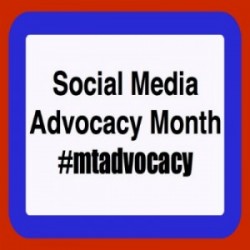As music therapists, we often read posts and articles about how to advocate for our profession. We read about advocating for music therapy when speaking with congressmen, schools, hospitals and even hopeful individual recipients of music therapy. We also read about being advocates as students and how important it is to advocate to future employers and community members. What about merging the two types of advocates? As professional music therapists, it is equally important to advocate for the future within our field. The professionals need to advocate to the students.
This past Fall, I had the pleasure of having several students both volunteer with a program I had been running and observe music therapy sessions in a variety of settings. Before and after each session, the students and I would discuss their plans, practicums, vision and current activities surrounding music therapy. They would also have an opportunity to ask me any questions regarding the populations I work with, the private practice I run or just music therapy in general. Here are three ways that I would like to stress to students and for future Music Therapists so that you can be a better advocate for our profession.
Conference Attendance: I understand it is difficult to get the funds to attend conference every year, as it was a difficult task for me during grad school. However, making an effort to attend regional conferences (far less expensive than national) are a great way to make connections, learn about music therapy outside of your current classes and make bonds to promote advocacy in the future.
Shadowing and Observation Opportunities: Find a different music therapist each semester, if possible, and watch what they do. Ask questions, tag a long for an entire day. Before you become an active advocate, you must learn a bit about what you will do when you enter the field full force.
Volunteer Opportunities: Test the waters, get involved and try something new. A great advocate is one that has experience. Someone who has demonstrated the efficacy of music therapy can better speak about it during advocacy opportunities.
Introduction: Advocacy –> Recognition –> Access
Since 2005, the American Music Therapy Association (INSERT LINK: http://www.musictherapy.org/policy/stateadvocacy/) and the Certification Board for Music Therapists (INSERT LINK: http://www.cbmt.org/advocacy/) have collaborated on a State Recognition Operational Plan. The primary purpose of this Plan is to get music therapy and our MT-BC credential recognized by individual states so that citizens can more easily access our services. The AMTA Government Relations staff and CBMT Regulatory Affairs staff provide guidance and technical support to state task forces throughout the country as they work towards state recognition. To date, their work has resulted in 35 active state task forces, 2 licensure bills passed in 2011, and an estimated 10 bills being filed in 2012 that seek to create either a music therapy registry or license for music therapy. This month, our focus is on YOU and on getting you excited about advocacy.


Well stated, Meryl. I too enjoy speaking to students about music therapy. If nothing else, they can advocate for music therapy services for themselves and their family members as they do through life. I love your three ideas for professional, too! What wonderful ways to grow our own knowledge.
Thanks JoAnn. I appreciate your comments 🙂